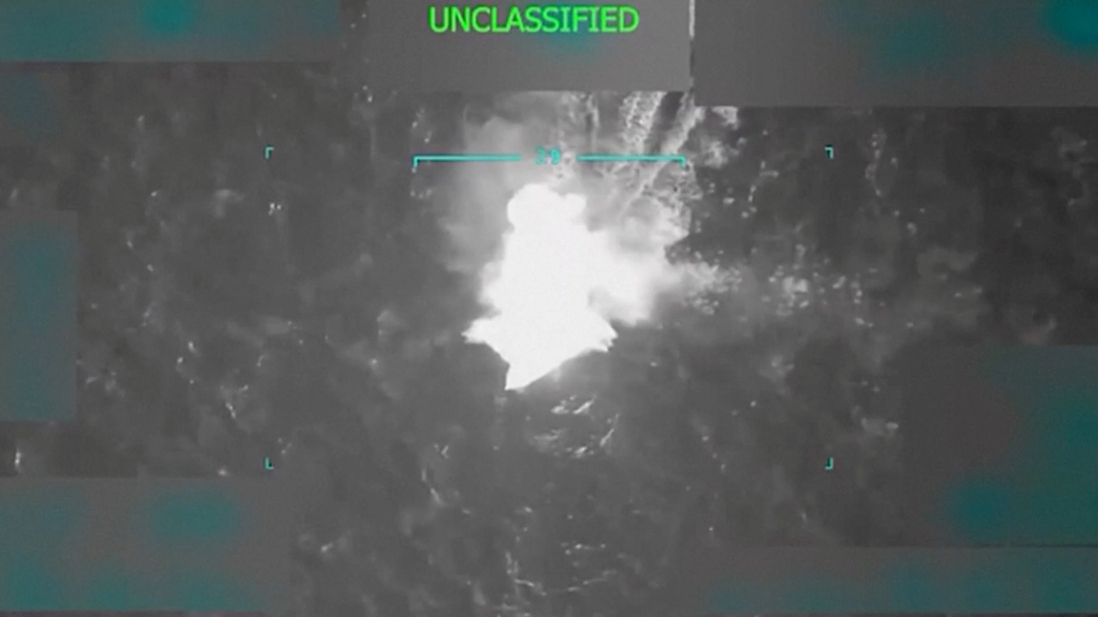live U.S. confirms troop deaths: All the latest news on Middle East conflict
The widening war between Iran, U.S. and Israel is leaving civilians and soldiers caught in its wake. Thousands of people are stranded across the Gu...

More than a week after President Donald Trump announced that the U.S. military had blown up a boat off Venezuela, the operation, which killed 11 people - largely remains a mystery to many in Washington.
Trump's team released a video of the 2 September strike and said it killed members of a Venezuelan gang transporting drugs. However, officials have not identified who was on board, what illicit drugs were on the boat or how the attack was carried out.
Some experts questioned whether the decision to summarily kill people merely on suspicion of smuggling drugs violated international law. Trafficking in an illegal substance is not normally considered a capital offence.
Officials have also given changing versions of where the boat was going. Shortly after the attack, Secretary of State Marco Rubio told reporters that the boat was probably headed to the Caribbean nation Trinidad & Tobago and Trump said it was headed for the U.S.. Rubio later amended his comment.
In a break with tradition, Congress was not briefed in the week following the strike, beyond a legally mandated written notice. This angered Democratic lawmakers, and analysts said it was unusual.
"Usually, you see much more robust engagement" from a presidential administration, said Scott Anderson, a fellow in governance studies at the Brookings Institution. "A week after, if they still have not given a briefing on what happened and why... that is strange."
Critics said the action in international waters was the latest example of Trump testing the limit of the law as he expands the scope of presidential power. The U.S. Constitution requires that Congress, not the president, must declare war.
In the notice to Congress, Trump cited the deaths of tens of thousands of Americans due to drug trafficking and said the vessel "was assessed to be affiliated with a designated terrorist organisation and to be engaged in illicit drug trafficking activities."
But experts said Trump's explanation did not address concerns that the strike violated international law. They noted that civilians were killed, while the Trump administration provided no evidence of what the vessel was carrying and did not establish that those on board threatened armed attack.
"Using the word 'terrorist' doesn't change the facts," Tess Bridgeman, a co-editor-in-chief at Just Security and a senior fellow at New York University law school, said in a social media post.
"If this is what it seems - laying the ground for using force in Venezuela, or elsewhere, without consent - it could portend an illegal and unnecessary war of choice," she wrote.
Trump has accused Venezuelan President Nicolas Maduro of running the Tren de Aragua gang, which Washington has designated a terrorist organisation. Maduro has denied any connection to the gang, and Caracas says it was rendered inactive two years ago.
Tensions between Venezuela and the U.S. have escalated in the wake of the Republican president's new approach to what he says is a war on illegal narcotics.
Trump has ordered the deployment of 10 F-35 fighter jets to Puerto Rico to conduct operations against drug cartels, and has sent at least seven warships to the Caribbean, carrying more than 4,500 sailors and Marines.
Marines and sailors from the 22nd Marine Expeditionary Unit have also been carrying out amphibious training and flight operations in southern Puerto Rico.
The Kremlin is utilising the recent United States and Israeli military strikes on Iran to validate its ongoing war in Ukraine. Russian officials are pointing to the escalation in the Middle East as evidence that Western nations do not adhere to international rules.
Saudi Arabia’s state oil giant Saudi Aramco closed its Ras Tanura refinery on Monday following an Iranian drone strike, an industry source told Reuters as Tehran retaliated across the Gulf after a U.S.-Israeli attack on Iranian targets over the weekend.
U.S. President Donald Trump said the U.S. military has enough stockpiled weapons to fight wars "forever"; in a social media post late on Monday. The remarks came hours before conflict in Iran and the Middle East entered its fourth day.
China’s Foreign Minister Wang Yi has held talks with his Russian counterpart Sergei Lavrov following recent military strikes carried out by the United States and Israel on targets in Iran, as tensions in the Middle East continue to rise.
U.S. first lady, Melania Trump chaired a UN Security Council meeting on children and education in conflict on Monday (2 March), a move criticised by Iran as hypocritical following U.S. and Israeli strikes that triggered a UN warning about risks to children.
Start your day informed with AnewZ Morning Brief. Here are the top news stories for the 4th of February, covering the latest developments you need to know.
Strikes across the Middle East are intensifying, fuelling travel disruption, driving up global energy prices and forcing diplomatic missions to shut their doors.
U.S. President Donald Trump has said the United States has a “virtually unlimited supply” of munitions and is capable of sustaining military action indefinitely, as the conflict with Iran entered its fourth day.
The United Nations has called for an investigation into a deadly attack on a girls’ primary school in Iran, which Iranian officials say has killed more than 100 children. The U.S. has said its forces “would not” deliberately target a school.
U.S. first lady, Melania Trump chaired a UN Security Council meeting on children and education in conflict on Monday (2 March), a move criticised by Iran as hypocritical following U.S. and Israeli strikes that triggered a UN warning about risks to children.
You can download the AnewZ application from Play Store and the App Store.

What is your opinion on this topic?
Leave the first comment